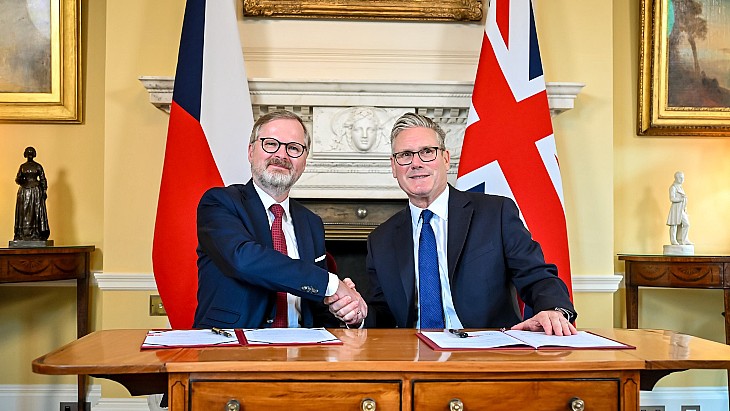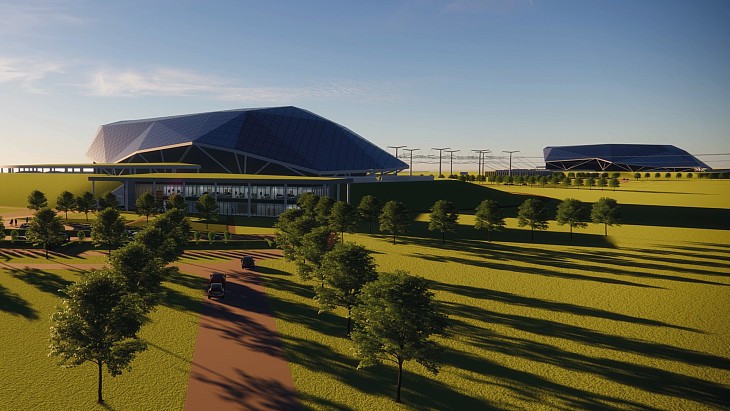The memorandum follows existing cooperation arrangements and expands joint activities in areas such as project preparation, construction, education, research and development.
The five-year memorandum of understanding (MoU) says: "The Participants intend to work together to encourage business and industrial collaboration to jointly leverage the complementary civil nuclear capabilities available to their countries with a view to accelerate the development of SMR technology, optimise opportunities for supply chain localisation to aid with efficient deployment and maximise mutual industrial benefit to their countries. The Participants also intend to explore opportunities across other areas of the civil nuclear life cycle and recognise the benefits of fleet deployment of SMRs to maximise efficiency, costs and delivery schedules, and are willing to explore this and any wider alignment between their respective programme to optimise their respective programmes, including working with wider partners where there is beneficial alignment between respective deployment approaches or in choice of reactor technology."
The Czech Republic's ČEZ last year took a 20% stake in the UK-based Rolls-Royce SMR, whose technology was selected as the most suitable for a future 3 GW fleet of small modular reactors (SMRs) in the Czech Republic.
Czech Prime Minister Fiala said: "Nuclear energy has great potential for the coming years, as it is experiencing its renaissance. I am even more pleased that ČEZ and Rolls-Royce will cooperate on the development and production of small modular reactors. This will be a great benefit to the Czech and British economies and jobs. We share a common view of energy with Britain, and we have a very similar plan with our British colleagues for what the energy future should look like. We consider a combination of large nuclear power plants, small modular reactors and renewable sources to be ideal. I believe that cooperation with Great Britain will help us ensure energy security and affordable energy for future generations."
UK Prime Minister Starmer said: "This agreement is about delivering for Britain - cleaner energy, better jobs, and greater security. By working with our Czech partners on small modular reactors, we're backing British engineering, strengthening our industrial base, and putting the UK in a leading position to export the technologies of the future."
Daniel Beneš, ČEZ CEO and Chairman, said: "The UK, like the Czech Republic, has a long nuclear tradition … the first small modular reactor from the British Rolls-Royce SMR in the Czech Republic should be built in Temelín in the first half of the 2030s."
Rolls-Royce SMR CEO, Chris Cholerton, said: "Political cooperation is a cornerstone of the civil nuclear industry … we welcome the desire from both Governments to accelerate the development of SMR technology and will work with them to optimise opportunities for supply chain localisation."
The Czech government said there were ambitions for a training centre to be built in the country and Rolls-Royce SMR was "examining the possibility of building a factory for the construction of modules in the Czech Republic".
Background
In the Czech Republic four VVER-440 units are currently in operation at the Dukovany site, which began operating between 1985 and 1987. There are also two units at Temelin and between them the six units generate about one-third of its electricity. A CZK407 billion (USD18.6 billion) contract was signed with Korea Hydro & Nuclear Power last month for two of its APR1000 reactors near the existing Dukovany units. The aim is to start construction in 2029.
The Rolls-Royce SMR is a 470 MWe design based on a small pressurised water reactor. It will provide consistent baseload generation for at least 60 years. 90% of the SMR - measuring about 16 metres by 4 metres - will be built in factory conditions, limiting on-site activity primarily to assembly of pre-fabricated, pre-tested, modules which significantly reduces project risk and has the potential to drastically shorten build schedules.
The UK generates about 15% of its electricity from 6.5 GW of nuclear capacity. The government plan is for that capacity to increase to 24 GW by 2050 to provide about 25% of electricity. As part of that capacity growth, Rolls-Royce SMR was chosen last month as the selected technology for the UK government's first SMR project.





_19544_40999.jpg)


_66668.jpg)





